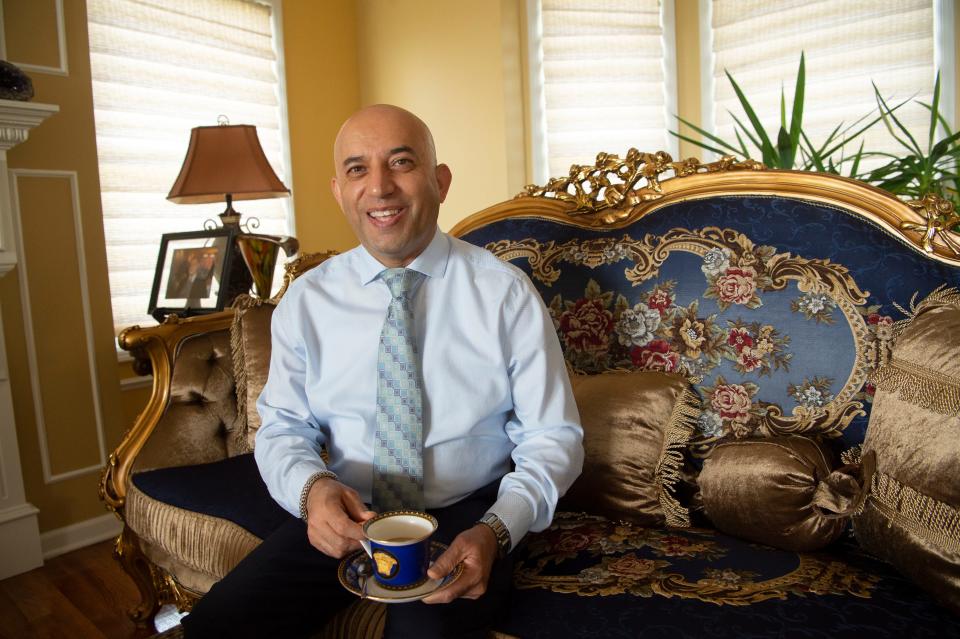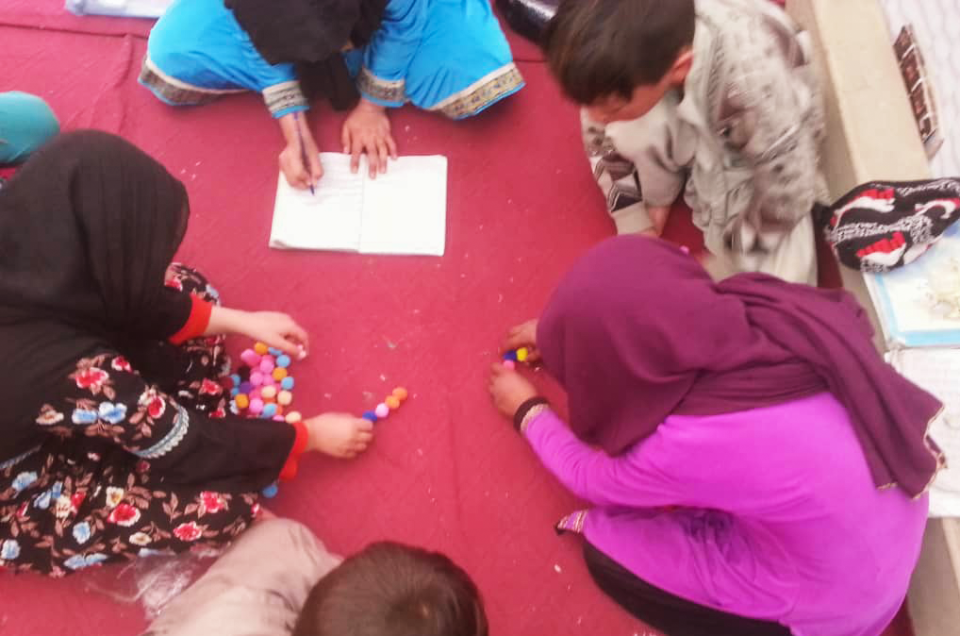This NJ nonprofit is keeping Afghan kids in school despite US sanctions, Taliban's return
In the video, four girls hover over sheets of paper spread across a carpet, gripping markers in their tiny hands as they trace shapes on worksheets.
The scene captures their first week in class at the home of a neighborhood teacher in Afghanistan. Over the next few months, the girls in Kandahar will learn how to write letters, spell and add.
The four are students in a new network of "microschools" that wouldn't exist without the efforts of an Afghan immigrant now living in North Jersey. For Zia Akbary, it's a way to help the country he left behind three decades ago, where children still deal with war, unrest and poverty.
Akbary, of Totowa, and his daughter Zarina launched the nonprofit Fardah Roshan Academy in 2020 to provide free classes to Afghan youth while employing local women as teachers. The classes take place in homes instead of school buildings, so they're less vulnerable to shutdown due to fighting and lack of funding.
“Education is the best way to save a country,” said Zia Akbary, who owns a jewelry store in Jersey City. “It can open minds. They can learn from people around the world.”

The classes are helping Afghans at a time when economic sanctions imposed by the U.S. and its allies have deepened poverty so severely that some experts say the impact could be even more deadly than two decades of war. The effort has persisted despite the U.S. pullout last summer and the reemergence of the Taliban.
‘Bright future’
Fardah Roshan, meaning “bright future,” offers classes for girls and boys in two groups between ages 4 and 9. Now in its third semester, the nonprofit has about 400 students in the Kandahar province. They are learning to read and write in a country where the literacy rate is around 43%, according to UNESCO.
The organization employs 60 women as teachers, along with several supervising principals and a superintendent. They each instruct groups of four and can teach up to two classes a day. The classes provide opportunities to women at a time when the Taliban, which retook power after the U.S. withdrew forces last summer, have restricted women’s right to work.
“It provides income for families, especially for needy families, and it’s also giving them a sense of hope,” Akbary said.
Classes run for one hour, six days per week, and are intended to supplement, not replace, regular school. But the founders of Fardah Roshan quickly learned that for many students, their program was the only source of classroom learning. Three out of four students were not enrolled in school, said Zarina Akbary.
Children who were in school typically had 40 or 50 students in a class, while Fardah Roshan offers a 4-to-1 pupil-to-teacher ratio. The nonprofit also opened two libraries packed with children’s books and held computer classes for older students to enhance learning and help them find jobs and sources of income.
To date, Zia Akbary has funded the venture mostly on his own. The academy costs about $2,500 a month for programs, supplies and salaries. Fardah Roshan also raises funds online, drawing about $6,400 last year and almost $5,000 this year. On its website, it says donors can sponsor a class for $24 per month, or a student for $6 per month.
‘Anything can make it better’

In a country of 40 million that has faced so much hardship, Zarina Akbary believes that the smallest efforts can have a big impact.
“When you have a children’s library and it is the only children’s library, the impact is that much more profound because people don’t take it for granted,” said Zarina, a biology Ph.D. student at New York University. “These are people who really need the help and who have needed the help. When you are in a situation that bad, anything can make it better.”
Her father recalled that “there was not a single library for kids” when he was a child in Kandahar. Akbary went to school on and off until about eighth grade and fled in 1989 to the U.S., where he was granted asylum.
“When I was growing up, there was fighting. It was Russians at that time. The mujahedeen backed by the U.S., they were burning schools. I’ve seen all these things. That’s why I’m so glad I’m in America,” said Akbary, 53.
He wanted to create what he described as "war-proof" schooling inside people's homes that would not be so vulnerable to the whims of war.
The idea for the academy was born in 2020, when Akbary and his daughter considered sending donations to an Afghan school but realized their impact would be greater if it was spread out among multiple microschools.
"We came up with the idea — a system to have school on every corner and every street so kids can be safe and parents can send them to a neighbor's house. And meanwhile, women sitting at home can earn money for their needs," he said.
But challenges remain since the U.S. ended its two-decade war last year.
Afghanistan has faced sanctions, a collapse of government services, the loss of foreign aid and sharp inflation. The Biden administration also froze $7 billion in assets from Afghanistan's central bank, setting aside half to be accessed by humanitarian groups and half to settle 9/11 lawsuits. The funds included Afghans' personal savings and money to administer the government.
Amid extreme poverty, many teachers have lost their jobs and have called the academy, or their husbands have called, seeking work.
“It’s getting day by day worse,” Akbary said. “People are desperate. Lots of people were unemployed when the government shut down. It’s a chain reaction.”
Uniting for Ukraine: NJ woman got approval to bring her Ukrainian family to the US. Here's how she did it.
‘Crisis response': Afghans stuck in NJ hotels and Airbnb as resettlement overwhelms system
'No Google for you'
Operating in Afghanistan has posed unique challenges. Fardah Roshan had to change wire-service providers after the U.S. withdrawal last summer. Turnover has been high among teachers and students as people have fled their homes in search of safety since the Taliban takeover. The nonprofit also had to suspend computer classes after the new regime restricted girls' access to school above sixth grade.
In Afghanistan, students often lack books, libraries, internet access and computers, Zarina Akbary noted. Even when there is internet access, “everything is made for the English-speaking world."
"If you are a kid in Afghanistan and you want to find out why is my blood red, or why do we cry tears, there is no Google for you," she said. "There are so many ways in which the world excludes them. Personally, I find it heartbreaking."
But Akbary and her father see hope in helping students learn to read and write and promoting a culture of learning and teaching. She also finds inspiration in Japan and South Korea — countries that were devastated by wars but today are leaders in education and economic growth.
“Maybe one day Afghanistan will have its own research university, its own textbooks,” she said. “It’s never not possible.”
Hannan Adely is a diversity reporter covering Arab and Muslim communities for NorthJersey.com, where she focuses on social issues, politics, bias and civil rights. To get unlimited access to the latest news, please subscribe or activate your digital account today.
Email: adely@northjersey.com
Twitter: @adelyreporter
This article originally appeared on NorthJersey.com: Fardah Roshan NJ nonprofit keeps Afghanistan kids in school

